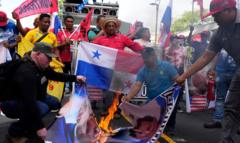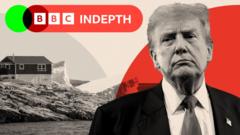In response to Donald Trump's controversial remarks regarding the Panama Canal and alleged Chinese military presence, President José Raúl Mulino firmly stated that there are no Chinese soldiers at the canal and emphasized Panama's control and sovereignty over the key shipping route.
Panama Rejects Trump's Claims on Canal Control and Chinese Presence

Panama Rejects Trump's Claims on Canal Control and Chinese Presence
Panamanian President defends national sovereignty amidst threats from US president-elect.
Panama City has become the focal point of heightened tensions following remarks made by US president-elect Donald Trump, which he shared on his Truth Social account, claiming that Chinese soldiers are operating within the Panama Canal. These comments sparked a protest near the US embassy in Panama City, prompting an urgent response from Panamanian President José Raúl Mulino, who deemed Trump's assertions as "nonsense."
In a press conference, Mulino emphatically denied any presence of Chinese military personnel in the nation, stating, "There is not a single Chinese soldier in the canal." He further dismissed any discussions regarding the reduction of tolls for US vessels or talks of regaining control of the canal. "The canal is Panamanian and belongs to Panamanians. There's no possibility of opening any kind of conversation around this reality," he asserted.
The President's firm stance comes in the wake of Trump’s claims that Panama is exploiting the United States with excessively high shipping fees. Referring to the charges, Trump stated, "The fees being charged by Panama are ridiculous, highly unfair," suggesting that, unless shipping rates were lowered, he would demand the return of the Panama Canal to the US.
Notably, Trump also made mention of appointing Florida lawmaker Kevin Marino Cabrera as his ambassador to Panama, a move interpreted as a means to reinforce US interests. In a series of social media posts on Christmas Day, Trump reiterated his views on both Panama's shipping tolls and other territorial matters, suggesting a belief that the canal could fall into "the wrong hands,” particularly referring to China.
Historically, the Panama Canal has served as a crucial maritime passage since its construction in the early 1900s, previously under US control until treaties transitioned ownership to Panama between 1977 and 1999. As a key navigation route for approximately 14,000 vessels annually, including those carrying military and commercial goods, any debate over its control brings heightened sensitivity in Panamanian-American relations, especially in light of China's significant investments in both the canal and in Panama as a whole.























